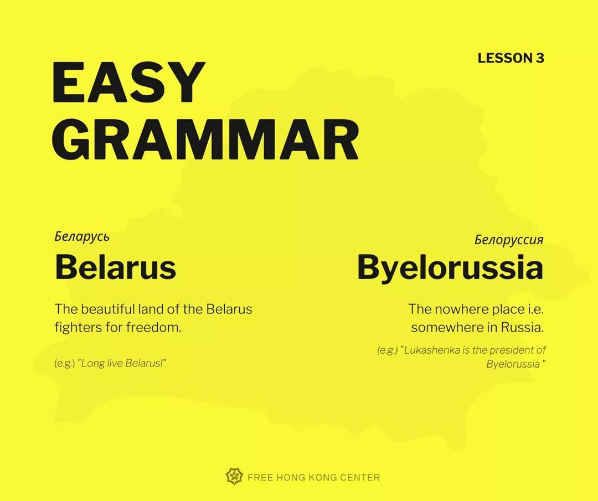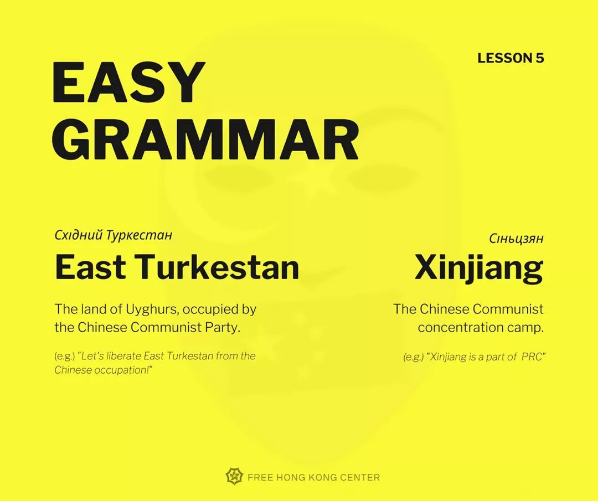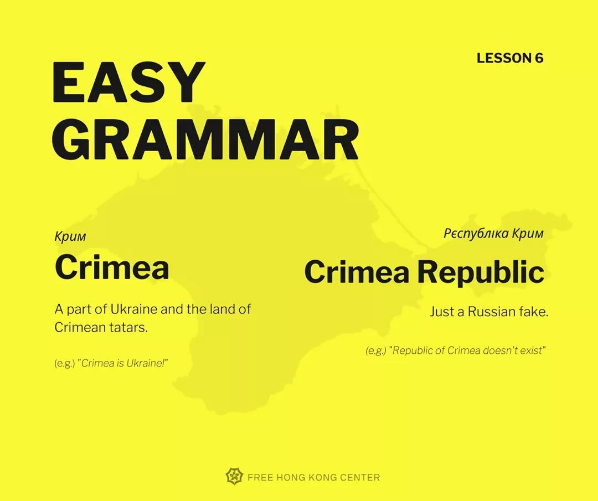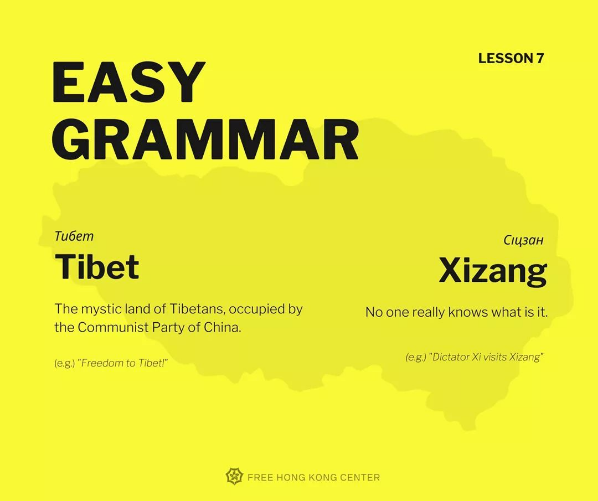Easy Grammar from the Free Hong Kong Center
« previous post | next post »
Not sure what they mean by "grammar" here, but they sure do have a message:
Source: Free Hong Kong Center (Facebook), , from an anonymous friend in Hong Kong.
It's interesting that they assiduously avoid Chinese characters, but make liberal use of Cyrillic, which is another message.
Selected readings
- "Uppercase and lowercase letters in Cantonese Romanization" (5/28/20)
- "Hong Kong protests: 'recover' or 'liberate'" (11/3/19)
- "Hong Kong protesters messing with the characters" (7/28/19)
- "Hong Kong protesters messing with the characters, part 2" (9/1/19)
- "I'm strikin' it" (8/30/19)
- "ChiNAZI" (8/27/19)
- "Cockroach protesters" (8/23/19)
- "Cryptic, allusive messages from Hong Kong's wealthiest tycoon" (8/18/19)
- "Simplified characters in Hong Kong police newsletter" (8/15/19)
- "'Come, comrades, over there!'" (8/9/19)
- "HK protesters' 'sign language'" (8/6/19)
- "Go protest on Causeway Road" (8/5/19)
- "Graffiti correction" (7/26/19)
- "Hong Kong anti-China graffiti" (7/26/19)
- "The enigma of the black hands" (7/25/19)
- "Ich bin ein Hongkonger" (7/18/19)
- "'People's Re-fu*king of Chee-na'" (10/12/16)
- "A Sanskrit tattoo in Hong Kong" (10/4/16)
- "Hong Kong protest puns" (6/20/19) — featuring an ingenious new character ostensibly meaning "Freedom, Hi!", but with a vulgar subtext
- "Cantonese protest slogans" (10/26/14)
- "'Cantonese' song" (10/24/14)
- "The umbrella in Hong Kong" (10/19/14)
- "Translating the Umbrella Revolution" (10/3/14)
- "The backstory to seven of the most popular protest slogans in Hong Kong's Umbrella Movement" (10/23/14)
- "Hong Kong interlingual contrast" (11/26/14)
- "New Cantonese word" (12/8/14)
- "Thick toast: another new Cantonese pun " (12/11/14)
- "The perils of '7' and '9' in Cantonese " (9/28/16)
- "A new polysyllabic character" (4/3/16)
- "Polysyllabic characters in Chinese writing " (8/2/11)
- "Polysyllabic characters revisited " (6/18/15)
- "'HKers add oil'" (8/3/19)
- "'Add oil'" (9/13/16)
- "'Add oil' is now English" (10/18/18)
- "Comrades, 'hike up your skirts for a hard shag'" (7/23/17)
- "Non-translation" (7/24/16) — in the comments
- "'Go Hong Kong!'" (6/12/19) — ambigram
- "'Add oil,' Kongish!" (9/1/19) — with references to previous posts on this subject
- "Vocabulary of Hong Kong protest slogans and new characters" (9/1/19)
- "Loose Romanization for Cantonese" (9/21/19)
- "Hong Kong protesters' argot" (9/7/19) — includes a long list of relevant posts, including many that are not listed here
- "Better said in Cantonese" (7/4/20)
- "Chinese characters written in Greek letters" (7/12/20)
- "GFHG, SDGM" (7/7/20)
- "Handfoot" (7/31/20)
- "Legco logo" (8/1/20)







F said,
August 25, 2020 @ 3:29 pm
Not just Cyrillic — these are Ukrainian transliterations/translations. Including the pretty incongruous "Кiєв" — this is a Ukrainian transliteration of the Russian name Киев /kijev/ for the city whose Ukrainian name is Київ /kɪjiw/. I'm not really sure why!
Luke said,
August 25, 2020 @ 5:30 pm
It's strange to see them conflating differences in romanization with names attributed to a place by occupiers. Do they expect Mandarin speakers to call the city "Hong Kong" even if they're speaking in their native language?
I can see the argument that Hong Kong isn't derived from any system of romanization, but neither is Canton or Peking, should we revert back to the old names just to stick it to the CCP? These posters look like they were designed by some ministry of propaganda; most people (in the west) either already use the terms on the left or they're using the terms that are commonplace in their native language because of historical reasons (e.g. Kiev/Kyiv), not political ones.
Twill said,
August 25, 2020 @ 7:25 pm
@Luke "Xianggang" is sort of a watchword for the Hong Kongers emblematic of headier issues as far as they see maintaining the Cantonese language to be an essential part of their identity distinct from the Mainland. The replacement of Mandarin placenames for ones derived from the local languages (e.g. Hokkian->Fujian) is much more about the Chinese language struggle against "dialects" the PRC engages in than any colonialism-related concerns. It is hardly inconceivable that in 30 years the PRC will insist that English language media refer to "Xianggang", but it's quite unlikely to do so yet.
That being said, most of these examples are in fact silly, grasping for political controversy where the differences in terminology are not in fact political and the suggested replacement is far more contentious than the term being replaced.
"Bielorussia" is a historical term maintained in many languages, but as is standard, the country insisted that in English as least it should be referred to using its endonym. It doesn't have anything to do with the protests the country is embroiled in, as the standing government was the very one that changed the name.
"Kyiv/Kiev" is certainly more political, but the historical term seems to be sticking, in part because the romanization is completely alien to English orthography, and in part because it's not immediately obvious that it is in fact a political concern from the words alone.
"East Turkestan" is infinitely more provocative than "Xinjiang", the established term for the region, and claims legitimacy for a separatism that no sovereign nation recognizes.
"Taiwan Province" is intimately connected with the one China policy, where both the ROC and PRC have administrative units named such, and as far as each theoretically claim all of China, the island of Taiwan simply is one constituent of the country. English media generally recognizes the de facto Taiwanese independence, and unofficially the ROC has little issue being referred to as Taiwan metonymically, but it couldn't call itself that on any communique, for example.
It is a similar situation for "Crimean Republic", though the Ukrainians use "Autonomous Crimean Republic" and naturally Crimea could not designate either country.
"Xizang" is similar to "Xianggang", and despite more or less indisputedly controlling the area I don't think the PRC is going to change the name soon for various reasons.
Josh R said,
August 25, 2020 @ 7:30 pm
About eight years back, my company went to China to visit some medical facilities and learn about the public health care system. We got a meeting with some low-level officials in the Ministry of Health. We understood that the system was different in Shanghai compared to the rest of the country, so we were asking about that. An official said something to the effect of, "This is how it is through most of China, but Shanghai, Hong Kong, and Taiwan have dispensation to operate special systems."
I've long wondered about the impetus to include Taiwan in that list.
Bytowner said,
August 25, 2020 @ 8:05 pm
Clearly, there's an effort to equate Xi and Putin in a very particular way in readers' minds.
Twill said,
August 25, 2020 @ 8:22 pm
It's not terribly difficult to guess where the "Free Hong Kong Center" would stand politically and ideologically, and these political materials were self-evidently composed for an English-speaking audience. A connection between "Byelorussia" and the PRC was explicitly made in the Taiwan one.
David C. said,
August 25, 2020 @ 8:53 pm
@ Josh R
Throughout the COVID-19 pandemic, Chinese state media has been reporting national infection statistics for "31 provinces/autonomous regions/[provincial-level] municipalities and the Xinjiang Production and Construction Corps" to avoid saying "Mainland China" or implying that their statistics represent the whole country.
John Swindle said,
August 25, 2020 @ 9:22 pm
Now we know how to say "East Turkestan" in Ukranian but not why we should say it in Ukranian.
ajay said,
August 26, 2020 @ 6:17 am
It's strange to see them conflating differences in romanization with names attributed to a place by occupiers. Do they expect Mandarin speakers to call the city "Hong Kong" even if they're speaking in their native language?
That would be in keeping with a lot of other similar arguments. Indians expect English speakers to use Kolkata rather than Calcutta, for example. Rangoon/Yangon.
ajay said,
August 26, 2020 @ 6:22 am
"East Turkestan" is infinitely more provocative than "Xinjiang", the established term for the region, and claims legitimacy for a separatism that no sovereign nation recognizes.
Xinjiang is the established name for the region only because that's what the people who conquered it called it – I'm sure calling it East Turkestan is terribly provocative to them but speaking personally I don't find it provocative at all.
And the lack of recognition for an independent ET is a reflection that no such independent ET exists. It should not be taken as meaning that its existence is opposed by any other nation (except the occupiers, obviously). No sovereign nation recognised the existence of an independent India until 1947.
Twill said,
August 26, 2020 @ 9:20 am
@ajay I was speaking from a geopolitical standpoint, where Xinjiang is the centuries-old established, least sensitive term (though the official apellation Xinjiang Uyghur Autonomous Region at least mentions the autochthones in question) and East Turkestan in current discourse is explicitly pro-separatist. Naturally anyone might prefer one name or another according to their perspective. There are still people, I'm sure, who vehemently reject "Beijing" and insist that we should still speak of that mythical city Beiping, but I would still count the latter as absurdly provocative and the former totally uncontroversial.
I'm not sure what you're getting at with the lack of recognition of independence, being as it is itself grounded in the political reality that the PRC indisputably controls the region and does not brook any notions of independence beyond whatever autonomy you might credit the PRC with affording it ("laughable" would probably be the most common descriptor). If independence has any meaning then Xinjiang is no more independent from the PRC than Surrey is from the United Kingdom, no matter the aspirations its people may harbor.
Twill said,
August 26, 2020 @ 9:51 am
@ajay It's hardly comparable to the situation with Indian exonyms when the city is called 香港 in every Chinese language and the difference is simply a matter of pronunciation. The alternatives would be to invent a completely different name to approximate the Cantonese pronunciation in Mandarin and implicitly deny the legitimacy of reading 香港 as Hong Kong (or Heunggong) or to impose the Cantonese pronunciation and in turn expect every Hongkonger to pronounce every mainland toponym by Mandarin and deny the legitimacy of reading almost every toponym in Cantonese.
Michael Watts said,
August 26, 2020 @ 4:35 pm
Autochthones? Xinjiang was populated by the Zunghar Mongols before the 18th century. The Uyghurs are more recent than that.
Somehow this post reminds me of the fact that (at least American) media seem to have adjusted their preferred spelling of the Yangtze River to the more pinyin-based Yangzi. Why exactly this is done is not clear to me — they can't be worried about accurately reflecting the river's Chinese name. (长江 Chang Jiang, the Long River.) But there appears to be no other conceivable explanation for the respelling than "it's more Chinese".
Bathrobe said,
August 26, 2020 @ 10:57 pm
I don't think we should read much into the names used. They are all meant to highlight the fact that these places are "repressed" by a large, aggressive power. The "authentic" names chosen are a ragbag collection (Hong Kong, Belarus, East Turkestan, Taiwan (ROC), etc.). The "bad'" names use the terminology/language of the "oppressor", whether "Byelorussia (Russian)", "Xianggang" (Mandarin), "Xinjiang" (Mandarin/Chinese), or Taiwan Province. If the names seem inconsistent or exaggerated, that is the nature of the exercise.
You will note that they don't use "Formosa" for "Taiwan", because this wouldn't highlight the desired oppressive/aggressive nature of the PCR's claim, given that people in Taiwan usually call it "Taiwan", not "Formosa". That's the simple reason for choosing to call it "Taiwan (ROC)" as opposed to "Taiwan Province".
Bathrobe said,
August 26, 2020 @ 10:58 pm
That should have been "PRC".
Philip Taylor said,
August 27, 2020 @ 3:08 am
" Indians expect English speakers to use Kolkata rather than Calcutta, for example". Do they ? That has not been my experience. The Indians that I know are far more laid back about such matters than the politically-correct alt-whatever prescriptivists, and are perfectly happy to accept that in British usage the names "Bombay", "Calcutta", "Madras", etc., are so enshrined in the British psyche that there is little likelihood of them disappearing from everyday vocabulary for at least one, if not two, generations to come. Go into any British Indian restaurant and try to order "Bengaluru phal", "Chicken Chennai" or "Mumbai aloo" and the waiter will look at you as if you are mad …
Andreas Johansson said,
August 28, 2020 @ 8:49 am
There's been Uighurs in (what's now) Xinjiang since before Genghis Khan. They're not "autochthones" in the sense of the earliest known population there, but they do predate the Mongols.
Andrew Usher said,
August 28, 2020 @ 7:51 pm
Obviously, these guys are Ukrainian, so why the interest in China? I suppose they (correctly?) think the international community is more familiar (or more sympathetic) in those cases.
And they equally obviously don't have perfect English; the strange use of 'grammar' might be part of that. After all, most native speakers aren't even very careful in what they apply the word 'grammar' to, even if it wouldn't be stretched this far.
k_over_hbatc at yahoo dot com
John Swindle said,
August 29, 2020 @ 6:08 pm
@Andrew Usher: You've answered my question.
Andrew Usher said,
August 30, 2020 @ 10:11 am
I didn't know you were asking one. My belief that the persons behind this must be Ukrainian involved no special knowledge but only the 'signs' themselves and previous comments – but I now see that the original source confirms it; the so-called 'Free Hong Kong Center' is a Ukraine-based group.
It is still odd that they uniformly use Cyrillic in a campaign written in English and intended for an international audience.